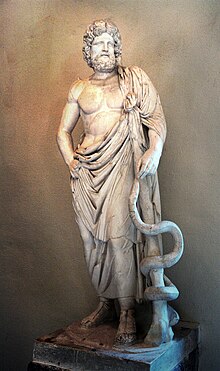Aesculapius
| Asclepius | |
|---|---|
| God of medicine, healing, rejuvenation and physicians | |

Asclepius with his serpent-entwined staff, Archaeological Museum of Epidaurus
|
|
| Symbol | Serpent-entwined staff |
| Consort | Epione |
| Parents | Apollo and Coronis |
| Siblings | Step-siblings of Asclepius |
| Children | Hygeia, Iaso, Aceso, Aglaea, Panacea, Machaon, Podalirius, Telesphoros, Aratus |
| Roman equivalent | Vejovis |
Asclepius (/æsˈkliːpiəs/; Greek: Ἀσκληπιός, Asklēpiós [asklɛːpiós]; Latin: Aesculapius) was a hero and god of medicine in ancient Greek religion and mythology. Asclepius represents the healing aspect of the medical arts; his daughters are Hygieia ("Hygiene", the goddess/personification of health, cleanliness, and sanitation), Iaso (the goddess of recuperation from illness), Aceso (the goddess of the healing process), Aglæa/Ægle (the goddess of beauty, splendor, glory, magnificence, and adornment), and Panacea (the goddess of universal remedy). He was associated with the Roman/Etruscan god Vediovis and the Egyptian Imhotep. He was one of Apollo's sons, sharing with Apollo the epithet Paean ("the Healer"). The rod of Asclepius, a snake-entwined staff, remains a symbol of medicine today. Those physicians and attendants who served this god were known as the Therapeutae of Asclepius.
The etymology of the name is unknown. In his revised version of Frisk's Griechisches etymologisches Wörterbuch (Greek Etymological Dictionary), R. S. P. Beekes gives this summary of the different attempts:
...
Wikipedia
